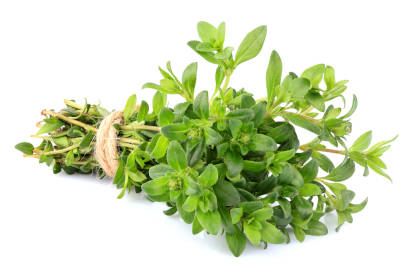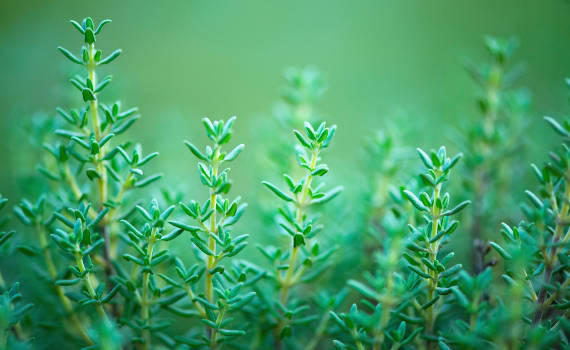You don’t have to go far to find powerful ingredients for your spells and charms. In fact, you probably have at least one in your home right now: thyme.
A much-beloved staple of spice cabinets everywhere, thyme has a long history of use as more than just seasoning. From bees, to warriors, to faeries, to witches, thyme has a varied (and surprising) group of fans worldwide.
Magical Properties of Thyme
Thyme is considered an all-around positive herb. It’s used in spells to dispel sadness, maintain a cheerful outlook, and protect from the negative energy of others. This makes it a favorite among people who are sensitive to others’ moods. It encourages positive actions and instills courage.
Make a floor wash or burn thyme in the home to lift oppressive energies. This is especially helpful after family arguments, sickness, or tragedy.
Thyme is considered a favorite of spirits. Planting it in the garden is said to attract faeries and benevolent nature entities.
Thyme is ruled by the planet Venus and the element of water.
See also: Check out Thyme herbs here, and Thyme essential oils here.
Benefits & Uses of Thyme
Thyme contains thymol and carvacrol, which are naturally-occurring antibacterial compounds. One study found that a tincture of thyme was as or more effective than commercial products at fighting acne.
In addition to fighting germs, carvacrol may improve mood. One study found that consuming carvacrol for seven days increased dopamine and serotonin levels in the brain.

Thyme contains the antioxidant compounds luteolin and apigenin, as well as saponins and tannins. These neutralize free radicals, protecting cells from oxidative damage.
The herb has traditionally been used to soothe coughs and sore throats. Modern research backs this up.
Thyme is very aromatic, which makes it a useful natural insect repellent. The scent of thyme covers up the chemical signals that mosquitoes and other biting insects use to detect human prey.
Possible Risks & Side Effects of Thyme
As with any herb, allergies are possible. These can manifest as anything from a rash, to anaphylaxis. If you are allergic to thyme or any of its relatives, please substitute a different herb. Some cross-reactions can occur in individuals who are allergic to basil, rosemary, or celery.
The same compounds that make thyme antibacterial can also damage sensitive skin. Eating too much thyme is associated with irritation to the mucous membranes of the mouth and throat.
This danger is chiefly associated with thyme essential oil, which is a highly concentrated compound. Never use any essential oil straight, always dilute it with a carrier oil before use.
One particular variety of thyme, Thymus serpyllum, was found to adversely affect levels of thyroid hormones. It acts directly on the pituitary gland, which sends signals to the thyroid gland. Thyme should be avoided by anyone taking prescription thyroid hormones.
Thyme can stimulate the uterus, and should not be taken during pregnancy.
Compounds in thyme can interfere with chemotherapy. Patients undergoing chemotherapy are advised to stop consuming thyme two weeks before treatment.
Thyme has a low potential for toxicity. It’s considered safe when consumed in the amounts that you’d use to season food.
Thyme History & Folklore
Humans and thyme have a long history together. The Ebers Papyrus, dating back to 1550 BCE, mentions the medicinal use of the herb.
Etymologically, thyme is linked to several Greek words — one meaning “incense,” which hints that it may have been burned for religious purposes, one for “perfume,” and one for “bravery.”
The ancient Greeks also seasoned wine with thyme to increase its intoxicating abilities. Thyme was used in massage oils to increase bravery, and women dressed their hair with it to enhance their beauty.
Thyme was so important to the Greeks and Romans, in fact, that soldiers spread it through Europe during the Roman conquest — along with its associations with courage.

Knights wore sprigs of the herb for bravery in battle, and Scottish people drank tea made with thyme to increase courage.
In late medieval Europe, thyme was strongly associated with the fae. In fact, it was considered dangerous to bring it inside the home, lest it bring faeries in with it!
The plant was used as a strewing herb since antiquity, but some sources contradict this. By the 19th century, it was regarded as extremely unlucky to bring wild thyme into a home in Britain.
This may have been an extension of the belief that it was beloved by faeries, and they might enter the home along with the thyme — not all faeries are kind and helpful.
Getting Started With Thyme
Chances are, you already have thyme in your home — just check your spice cabinet. It’s inexpensive and easy to find, so it’s a great herb for beginning kitchen witches.
Hold the thyme in your dominant hand, and visualize it filling with warm, glowing energy. Tell the herb what you’d like it to do, then add it to food. Stir clockwise using a spoon held in your dominant hand.
Since thyme instills courage and chases away bad dreams, it’s ideal for dream pillows. Either make a special nightmare-eliminating sachet using dried thyme, or combine it with lavender and other sleep herbs.
Keep on your bed or under your regular pillow. Before going to sleep, gently squeeze the sachet and inhale its fragrance.
If you find yourself in need of a little courage or a mood boost, wear a sprig of fresh thyme. Pin it to your jacket, or buy or make a special vase pendant for wearing fresh herbs.
These pendants are pretty much small hollow vessels on a chain, and very helpful for those who like crafting and wearing herbal amulets.
Thyme is a beloved culinary, medicinal, and beauty herb, in addition to all of its magical properties. With its uplifting scent and tiny, bee-attracting flowers, it’s also a wonderful addition to the garden.
If you want to cultivate a relationship with this lovely plant, try growing your own. Your local pollinators will love you for it.
As an Amazon Associate, Terravara earns from qualifying purchases at no additional cost to readers.
